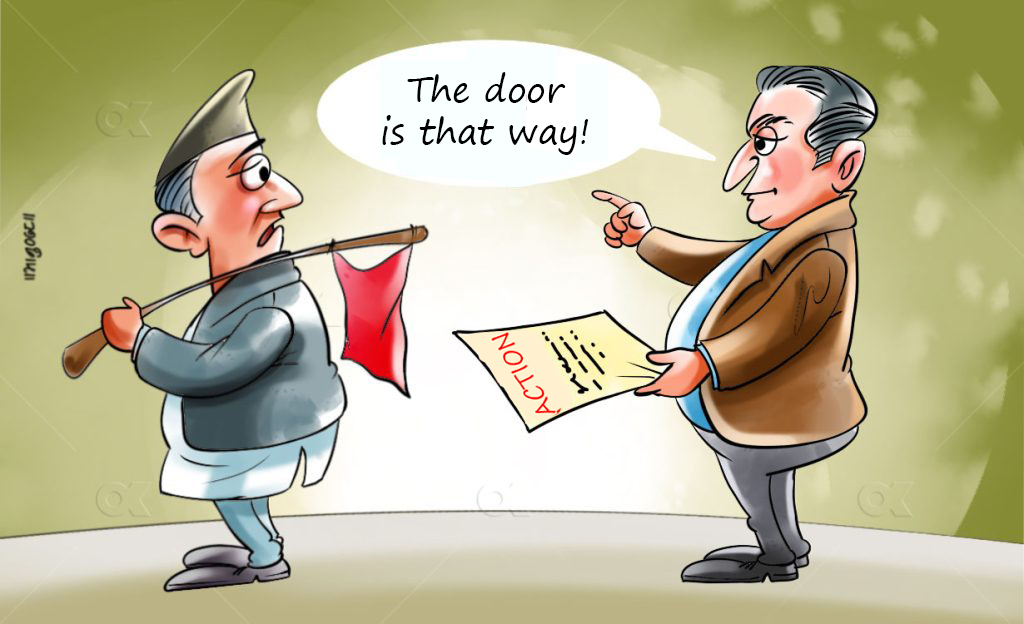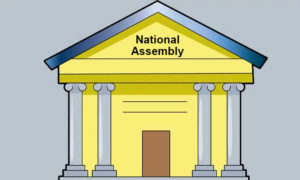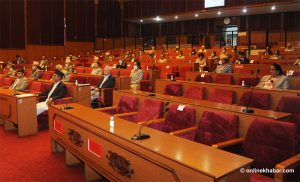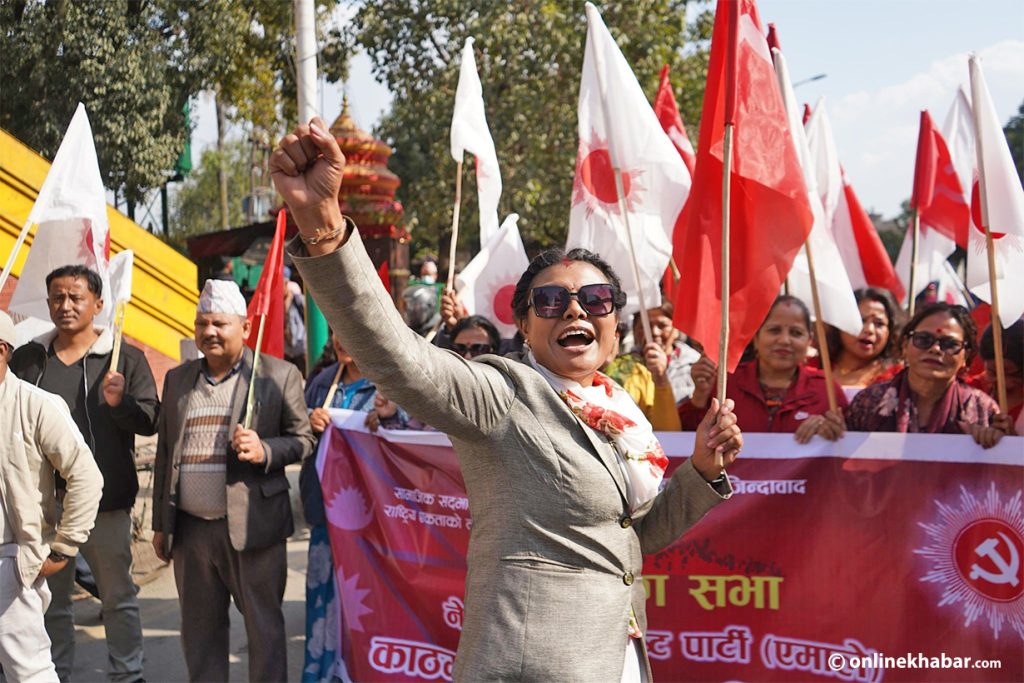Mahadev Singh Dadal had just been elected the ward chair of Marma rural municipality-6 in Darchula in the 2017 local elections when he got a call from Lalit Singh Bohora, the district chair of the Nepali Congress. In the call, Bohora gave Dadal, a junior leader of the party, a few instructions.
“He told me to follow orders given by office assistant Amar Singh Kotari. But, I refused to do so,” says Dadal.
Irked by that, Bohora wrote a letter to the Nepali Congress central office stating Dadal had quit the party. Following the letter, a meeting of the Nepali Congress’ central committee on December 15, 2019, removed Dadal from the party and asked the Election Commission to make his post vacant taking help of a legal loophole. In a few months, Dadal was out of office.
What happened in Baglung was even worse. On October 29, 2019, the ward chair of Dhorpatan municipality-4, Tilak Pun, had to endure physical assault. Later, Pun was also accused of throwing away relief materials sent during the Covid-19 pandemic. But, this charge was not enough to fire him from his post. To ensure he was gone, Rastriya Janamorcha accused him of joining the Nepali Congress. Pun and ward member Tilak Phagami were removed from the party accusing them of quitting the party. Following this, the Election Commission removed them from their position.
Chhaya Devi Devkota was elected as the deputy mayor of Bhajani municipality in Kailali. She had contested the 2017 local elections from CPN-Maoist Centre. But, when the Maoist Centre and the UML merged, she became a member of the unified (now dissolved) Nepal Communist Party.
But, the two parties soon split. Following that, the Maoists accused Devkota of quitting the party and joining the UML. But, she did not agree and fought. But, on June 25, 2021, she was removed from the post following complaints made by the Maoists to the Election Commission.
There are various examples like this in which parties are using legal loopholes, in both the laws and the constitution, wrongly and removing elected representatives from their posts. All three of the above examples show how political parties are weakening the democratic institution of elected representatives.
De-electing the elected

Since 2017, 32 elected representatives have been removed from the positions by the Election Commission. Out of them, 28 were removed after the commission was told that these people had quit their respective parties.
But, the Supreme Court told the commission to reinstate these elected representatives as removing them was against the constitution. Following the order, the 28 elected representatives removed on charges of quitting the party have since been reinstated.
But, why are political parties taking action against these local representatives who they themselves handpick in the run-up to the local elections?
The legal loophole
To understand that, let’s dive into the Political Parties Act 2017, the major source of the legal loophole. Chapter 6 of the act talks about quitting the party. Section 31 of the chapter states that if a person quits the party, his/her position will be deemed vacant if it fulfils three criteria. First, they have to submit a written resignation. Second, they become a member of another party. And lastly, they form a new party.
But, there are many cases where they have been removed from the party without the representative resigning or joining another party. The Election Commission also rarely checks if the political parties fulfiled these three criteria before declaring the position vacant.
Meanwhile, the constitutional provision is different. The constitution’s articles 215 and 216 say the only way these positions can be deemed vacant are: a) if the person resigns, b) if s/he finishes term or c) if s/je dies. This shows how the Political Parties Act and the constitution are at odds.
“It does make sense to remove the person from office if they quit the party because they contested the election with the help of the party,” says Dinesh Thapaliya, the chief election commissioner. “But even though it makes sense, the constitution says otherwise and when the person is elected directly by the people, I think it is about time we reviewed this rule.”
He says that they were compelled to issue a notice about the position being vacant due to the legal loophole in the Political Parties Act that was drafted a year before the general elections. People being removed from parties was a sporadic affair. But, the trend started to go up from March 7, 2021, after the erstwhile Nepal Communist Party split.
Lack of justifications

The Election Commission has been adhering to the decision made by the central committee of the party and announcing that the post has turned vacant. The commission does not check if the decision made by the central committee meets the criteria of the Political Parties Act.
The act has a provision where the central committee needs to give the person a chance to share their side of the story. The party also has to form an investigation committee to determine if the person had actually done something wrong. But, in almost all cases, these provisions have not been followed by the political parties as they have been exploiting the legal loophole.
Take Chhaya Devi Devkota’s case for example. She had told her party that she had not quit the Maoists. But, her party still took action against her.
“They assumed that I was supporting KP Oli and took action against me. But, I had never taken UML’s membership,” she told the Supreme Court.
Devkota is one of 14 local representatives against whom the Maoists took action for the same reason. But, almost all of them have been reinstated after the court ruled in favour of the representatives that were wrongfully removed.
Is it democratic?
Despite the reinstatement of the officials, if the legal provision itself is democratic is still open to debate and criticism
From one perspective, these local representatives use the party and its symbol to contest elections. The party helps them to get to where they are and when they leave the party and still stay unpunished, many argue it leaves a negative mark on Nepal’s multiparty democratic system.
Former Supreme Court justice Balram KC is worried about political malpractices mushrooming in the country if these people are not punished.
“These leaders don’t obey party whip and also alter the election process without being punished. If these cases rise, the country will never be politically stable. We need to control this,” says KC.
But, according to the constitution, the local level positions cannot be left vacant. That is why the Supreme Court disregarded the Political Parties Act considering the provision as a legal loophole and asked the Election Commission to reinstate the people that it removed.
This has started a new debate. Is the Political Parties Act relevant? The Supreme Court does not think it is and it has even questioned its working procedure.
But, CEC Thapaliya says his office cannot do anything because when lawmakers were drafting the act, they did not pay attention to the constitutional provision.
“The commission hasn’t spoken about reviewing the act. But, if the act is amended, we will have our say. People are questioning our role, but what we are doing is following the process that is stated on the act,” says Thapaliya.

























